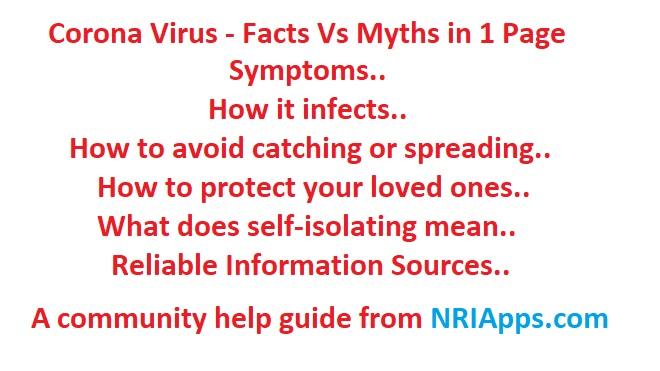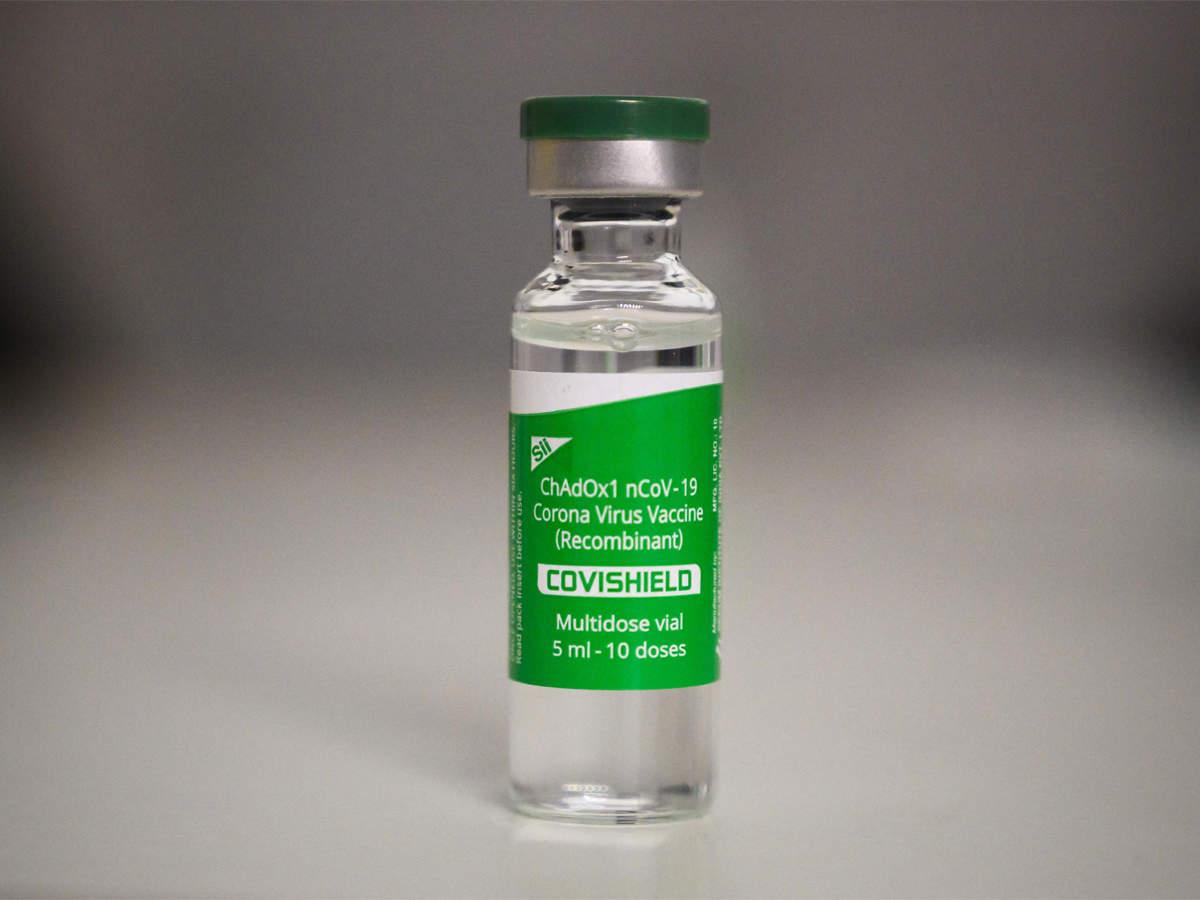Some CoronaVirus FACTS first:
- COVID-19 stands for Corona Virus Disease 2019. Its a particular strain of Coronavirus family which as of 06-Mar has infected more than 100000 people across the world. Mortality rate so far is 38/1000 people and its spread rate is 3+ which means every infected person will infect atleast 3 more people.
- A virus even a cold or flu or sars or measles or small pox virus has no medical cure after you are infected. In present day, even for a country like America, it takes minimum 18 months to develop a vaccine for any virus. A vaccine’s effectiveness can last for whole life or 5 years or 1-2 years. Common cold virus has 6 popular strains and on an average a person catches mild or strong cold roughly 6 times a year.
- Human body’s own white blood cells learn to fight the virus and kill it in X number of days. This X is an average number and is different for different viruses and it also depends on person’s immune system. Till X number of days person stays contagious (spreading infection) and if symptoms are severe then person can die. No medicine or food or water can teach white blood cells on how to detect the virus and kill it (only a vaccine can). You can be the strongest man on planet eating the most powerful or nutritious food/fruit/herbs and yet you can catch virus, get sick and die depending on speed and severity of symptoms and your own immune system.
CoronaVirus Infection Symptoms:
- The most common symptoms of COVID-19 are fever, tiredness, and dry cough. Some patients may have aches and pains, nasal congestion, runny nose, sore throat or diarrhea. These symptoms are usually mild and begin gradually. Some people become infected but don’t develop any symptoms and don’t feel unwell. Most people (about 80%) recover from the disease without needing special treatment. Around 1 out of every 6 people who gets COVID-19 becomes seriously ill and develops difficulty breathing. Older people, and those with underlying medical problems like high blood pressure, heart problems or diabetes, are more likely to develop serious illness. People with fever, cough and difficulty breathing should seek medical attention.
- Incubation period is typically 1-14 days. Average is 5 days. In this period an infected person doesn’t show any symptoms. Without symptoms like couging and sneezing, a person can’t infect others in incubation period.
CoronaVirus Method of infection:
- The disease can spread from person to person through small droplets from the nose or mouth which are spread when a person with COVID-19 coughs or exhales. These droplets land on objects and surfaces around the person. Other people then catch COVID-19 by touching these objects or surfaces, then touching their eyes, nose or mouth
- This virus doesn’t transmit through air or water. It survives longer in cold temperatures.
Human coronaviruses can remain infectious on inanimate surfaces like door handles, hand rails, table, plates and clothes at room temperature for up to 9 days. At a temperature of 30°C [86°F] or more, the duration of persistence is shorter. At temperatures of around 4°C or 39.2oF, certain versions of the coronavirus could remain viable for up to 28 days. At temperatures of 30–40°C (86–104°F), coronaviruses tended to persist for a shorter time. - Note: common masks out there will not protect you from Virus. Any govt. will not advise any use of common masks for protection. But if you have caught the infection then do wear masks as that will stop ths spread of infection or cover your mouth with tissues when couging or sneezing.
Precaution to avoid infection:
- Wash hands regularly, after touching things touched by others, wash for atleast 20 seconds and watch any good youtube video around washing hands with a soap.
- A soap is more effective than hand sanitiser (or even hand wash liquids) but since soap requires water, so carry sanitiser with you everywhere.
- keep clean, wash your hands often, get sanitary wipes and make sure to wipe down any chair you are going to set in out in the public, the same applies to public tables, even hand rails on stairs that are accessible to the public, wipe toilet seats in public rest rooms, wipe down sinks and faucets if it is public in short assume that it is contaminated and treat it accordingly.
- You can reduce your chances of being infected or spreading COVID-19 by taking some simple precautions:
- Regularly and thoroughly clean your hands with an alcohol-based hand rub or wash them with soap and water.
Why? Washing your hands with soap and water or using alcohol-based hand rub kills viruses that may be on your hands. - Maintain at least 1 metre (3 feet) distance between yourself and anyone who is coughing or sneezing.
Why? When someone coughs or sneezes they spray small liquid droplets from their nose or mouth which may contain virus. If you are too close, you can breathe in the droplets, including the COVID-19 virus if the person coughing has the disease. - Avoid touching eyes, nose and mouth.
Why? Hands touch many surfaces and can pick up viruses. Once contaminated, hands can transfer the virus to your eyes, nose or mouth. From there, the virus can enter your body and can make you sick. - Make sure you, and the people around you, follow good respiratory hygiene. This means covering your mouth and nose with your bent elbow or tissue when you cough or sneeze. Then dispose of the used tissue immediately.
Why? Droplets spread virus. By following good respiratory hygiene you protect the people around you from viruses such as cold, flu and COVID-19. - Stay home if you feel unwell. If you have a fever, cough and difficulty breathing, seek medical attention and call in advance. Follow the directions of your local health authority.
Why? National and local authorities will have the most up to date information on the situation in your area. Calling in advance will allow your health care provider to quickly direct you to the right health facility. This will also protect you and help prevent spread of viruses and other infections. - Keep up to date on the latest COVID-19 hotspots (cities or local areas where COVID-19 is spreading widely). If possible, avoid traveling to places – especially if you are an older person or have diabetes, heart or lung disease.
Why? You have a higher chance of catching COVID-19 in one of these areas
- Regularly and thoroughly clean your hands with an alcohol-based hand rub or wash them with soap and water.
Protection measures if you are already infected,
~~Featured COVID-19 articles~~
- Don’t Panic, here is how to BOOST your immune system to BEAT colds, flu and coronavirus 🙂
- Is ordering food for takeout or home delivery safe during corona virus outbreak?
- 🙏Pls Don’t Scare People and Kids About Corona! Majority Recover. Educate yourself and them about FACTS from W.H.O
- Options for Online Learning handy skills, new languages, short courses and knowedge gain while stuck at home
- COVID-19: Who is coping better? Indian Wives or NRI Wives? Lessons learnt in lockdown without Maid #ShareTheLoad
~~Featured articles end here~~
- Follow the guidance outlined above (Protection measures for everyone)
- Self-isolate by staying at home if you begin to feel unwell, even with mild symptoms such as headache, low grade fever (37.3 C or above) and slight runny nose, until you recover. If it is essential for you to have someone bring you supplies or to go out, e.g. to buy food, then wear a mask to avoid infecting other people.
Why? Avoiding contact with others and visits to medical facilities will allow these facilities to operate more effectively and help protect you and others from possible COVID-19 and other viruses. - If you develop fever, cough and difficulty breathing, seek medical advice promptly as this may be due to a respiratory infection or other serious condition. Call in advance and tell your provider of any recent travel or contact with travelers.
Why? Calling in advance will allow your health care provider to quickly direct you to the right health facility. This will also help to prevent possible spread of COVID-19 and other viruses.
Self Isolating Guidelines here – https://www.nhs.uk/conditions/coronavirus-covid-19/self-isolation-advice/
——Advertisement starts here ——
 NRIForShaadi.com World’s #1 App for NRI Matrimony. Thousands of members near your GPS Location. Download from NRIApps.com
NRIForShaadi.com World’s #1 App for NRI Matrimony. Thousands of members near your GPS Location. Download from NRIApps.com NRIfriends.net – World’s #1 NRI Friend Finder App, Find a NRI friend NEAR you, using hobby tags like #Cricket, #Badminton, #TeenPatti, #Carom. Find Desi Bollywood, Diwali, Holi Events local to you. Download from NRIApps.com
Join 20+ Hugely Popular NRIs Facebook Groups Local to you 🙂
———Advertisement ends here ———
What does self-isolating mean?
If you have been told to self-isolate, you need to stay indoors and avoid contact with other people for 14 days.
It is important to follow the advice for the whole period, even if you do not have any symptoms.
Do
- stay at home
- separate yourself from other people – for example, try not to be in the same room as other people at the same time
- only allow people who live with you to stay
- stay in a well-ventilated room with a window that can be opened
- ask friends, family members or delivery services to carry out errands for you, such as getting groceries, medicines or other shopping
- make sure you tell delivery drivers to leave items outside for collection if you order online
- clean toilets and bathrooms regularly
- think about a bathroom rota if a separate bathroom is not available, with the isolated person using the facilities last, before thoroughly cleaning the bathroom themselves
- use separate towels from anyone else in the household
- wash crockery and utensils thoroughly with soap and water; dishwashers may be used to clean crockery and cutlery
- stay away from your pets – if unavoidable, wash your hands before and after contact
Don’t
- do not invite visitors to your home or allow visitors to enter
- do not go to work, school or public areas
- do not use public transport like buses, trains, tubes or taxis
- do not share dishes, drinking glasses, cups, eating utensils, towels, bedding or other items with other people in your home
Information Sources:
- WHO Website – https://www.who.int/news-room/q-a-detail/q-a-coronaviruses
- WHO Myth Buster Site about CoronaVirus – https://www.nhs.uk/conditions/coronavirus-covid-19/self-isolation-advice/
- BBC Website – https://www.bbc.co.uk/news/health-51048366
- Track latest coronavirus info in UK: https://www.bbc.co.uk/news/topics/cyz0z8w0ydwt/coronavirus-outbreak
- NHS UK website : https://www.nhs.uk/conditions/coronavirus-covid-19/
Facebook Comments




